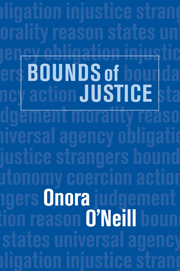Book contents
- Frontmatter
- Contents
- Preface
- Introduction
- Part I Philosophical Bounds of Justice
- 1 Four models of practical reasoning
- 2 Agency and autonomy
- 3 Principles, practical judgement and institutions
- 4 Kant's justice and Kantian justice
- 5 Which are the offers you can't refuse?
- 6 Women's rights: whose obligations?
- Part II Political bounds of justice
- Bibliography
- Index
3 - Principles, practical judgement and institutions
Published online by Cambridge University Press: 02 December 2009
- Frontmatter
- Contents
- Preface
- Introduction
- Part I Philosophical Bounds of Justice
- 1 Four models of practical reasoning
- 2 Agency and autonomy
- 3 Principles, practical judgement and institutions
- 4 Kant's justice and Kantian justice
- 5 Which are the offers you can't refuse?
- 6 Women's rights: whose obligations?
- Part II Political bounds of justice
- Bibliography
- Index
Summary
Contemporary writing in ethics and political philosophy is deeply divided about the importance of principles and rules. Most philosophical writing on justice seeks to establish principles of justice. These are thought of as stating standards to which just societies, institutions and actions are to conform – or at least aspire. However, many other writers on ethics suspect that practical principles or rules are corrupting, stifling or even illusory, and a fortiori that they are ethically disastrous. They maintain that ethical concern should focus on virtues and community, on care and commitment and on other distinctive excellences, and assert that none of these can be adequately specified or captured by principles or rules. The partisans of justice and of virtue often speak past one another. Theorists of justice concentrate on justifying universal principles, and are often rather uncommunicative about the implications of principles for particular cases. The sponsors of virtue care about sensitive discrimination and articulation of particular cases, but are often cavalier about questions of justice and justification.
It is worth reconsidering some of the criticisms that are brought against theories of justice, and more broadly against ethics of principle. I shall do so by offering an account of practical principles, and considering whether it falls foul of objections made by those who are suspicious of principles. I shall try to show that a commitment to practical principles is not only coherent but practical: when linked to a plausible account of practical judgement, principles can guide action.
- Type
- Chapter
- Information
- Bounds of Justice , pp. 50 - 64Publisher: Cambridge University PressPrint publication year: 2000



